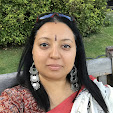Added on 5th Mar 2008 : An edited version of this guide was also published in the BCA Chronicle for the month of March 2008.Was writing a Guide for
Expat Women - City Experiences and thought of posting the information here too to benefit my blog readers
A copy of this post is available on their site at
http://www.expatwomen.com/city_experiences/cairo_egypt_jan1908.phpCity Description:Cairo if described in one word is "Chaos" But you soon realise there is some innate method in the madness & things somehow pull together & work.
It has extreme weather conditions. Temperature reaches almost upto 50C in Summer and down to 3-4C in Winter. March is the month for the Khamseen (sand storms). You can expect light rain in January.
Pros and Cons:How do the locals feel about foreigners?
Locals have mixed feelings about foreigners and its not easy to generalize. I have met with all kinds of receptions ranging from curiosity to resentment. But for the most part, foreigners and their dollars are welcomed by majority of the population that I have come in contact with.
What are the positive and negative aspects of living in your city?
The city is rich in culture and heritage. From the pyramids of the Pharaonic era (5000 years ago)to the Citadel of Saladin to the Cairo Tower.
The traffic, the pollution, the dust, the lack of respect for time and the cacophony can be nerve wracking at times.
Is this a good city for families/singles/couples/gays and lesbians?
Children of all ages will feel welcome in Cairo and its easy for parents with kids to develop support networks. Singles and couples also have a lot on offer. (If I'm not mistaken homosexuality is either illegal or believed not to exist at all in this country.)
Problems with racial, religious or gender prejudices?
The only 3 religions that are believed to exist are the monotheistic religions of Judaism, Islam & Christianity. The others aren't recognised.
Women have a lot more freedom and rights in Egypt than I have noticed in other Middle Eastern countries. Quite a large number of women in Egypt work outside their home.
Is there a specific dress code?
Many women in Egypt cover their heads with a veil, some do wear other forms of Islamic dress like the abaya and niqab, but it is not expected to be worn by all women.
In general it is a good practice for women to cover their forearms and knees when out in public. This is more to avoid unwanted attention than anything else.
Tourists do wear everything from halter to bikini tops, but keeping in mind local sensibilities it is better to avoid this display of skin.
Many Mosques and Coptic Churches will insist on arms and knees being covered for both men & women visitors. Some will ask you to cover your head. A loose shawl or cap will suffice.
Are there any Security concerns? (car jacking, robberies, kidnappings, etc.)
Egypt is relatively crime free. If you do not consider blatant overcharging by touts a crime :) There are a lot of security measures in place at most locations that expats/tourists would visit, including malls, heritage sites and hotels.
Advice to help avoid problems?
Respect local sensibilities (this is applicable in any country that you move to)
Avoid public displays of affection like kissing and hugging.
Immigration / Visas / Work Permits:
Visitors from some countries require visas before arriving whereas passport holders from USA and some other countries can apply for visas on arrival at the airport for about 15USD.
If you are hired by a company before you arrive, try and get your work permit from this company before you actually arrive in Egypt. Its not as easy to find a company to hire you and sponsor your work permit after arriving in Egypt.
Accomodation:
What is the typical housing for expats?
Apartments, house boats (on the Nile - limited numbers and extremely basic) and villas are available for rent.
Apartments range from unfurnished to fully furnished. Fully furnished means all the furniture, AC's in every room except the kitchen. A TV, washing machine, refrigerator, cooking stove and dishwasher.
Where are the best places to live?
Maadi is the number one choice for most expats. Zamalek, Mohandaseen, Katameyya, 6th of October City, Heliopolis, Rehab are some other areas expats may choose to live in. I have a detailed article posted at Where Should I live in Egypt/Cairo
What is the typical cost in rent?
Rent could range between 500USD to 6500USD per month depending on various factors.
Is there a typical payment process?
The typical payment process is a one month security deposit and quarterly payments in advance. The agreement is typically for one year. At the end of the year, they may ask for a 5-10% increase in the rent.
What is important to look for and/or negotiate when looking for accomodation?
When looking for accommodation, always get all the jobs that you want done in the house accomplished before you move in to the house. Thats when most landlords/landladies will work the fastest. Once you move in and ask for things to be done then it could take weeks even to get them to change a lightbulb.
Look for water pressure in the taps.
Check for earthing of the electrical connections.
Check who pays which utilities.
Parking is a pain in most areas, check if your landlord/landlady has any ear-marked parking of the apartment (almost impossible but worth a try)
Every price in Cairo is negotiable including house rent. You can try to negotiate rent downward or ask for extra utilities like a 2nd TV, a microwave etc.
Household Help:Help is easily available in Egypt. Finding good help is a matter of trial & error and requires patience.
Help is available from locals, rest of Africa (mainly Sudanese) and South East Asian.
Maids charge upwards of 30LE per hour. Monthly rates to be negotiated.
Drivers 800LE upwards.
Gardeners and Nannies are also available
You will have to pay more for English/French speaking staff.
You can give your clothes out for ironing/pressing at the rate of 1LE per item of clothing.
Dry Cleaning is also pretty reasonable.
Communication:
Telephone:
The best way to call home is mobile telephony (better connectivity & clarity) or over the internet if you have a decent speed connection.
Vodaphone & Mobinil are the 2 long term mobile players in the market. Etisalat has just come in last year.
The fixed line is only available from the government provider, if I'm not mistaken.
Internet Access:It is possible to connect to the internet using a dial up from any land line telephone at about 1-5LE per hour. Link DSL and TEDATA are the 2 major ISP's. Depending on your area of residence you can check which one provides better band width.
Free Wifi is available at most McDonalds, Cilantros and other cafes and restaurants.
ISP's provide various packages starting from 45LE per month.
TV/Newspapers:
Nilesat provides you with plenty of free to air local channels plus Dubai based English channels MBC4, MBC2, MBC action, Dubai One, BBC, Fatafeat, Selevision among others. MBC4 & MBC Action show programs like According to Jim, CSI, Oprah, Dr Phil, 24 etc. MBC2 shows pretty recent Hollywood movies through the day.You can pay for bouquets from Showtime and Orbit among others.Al Ahram and a couple of other English language newspapers are available.I personally prefer the magazines to the newspapers.
Local Language :
Learning the local Arabic language will be an extremely huge advantage when living here. All Egyptians speak to each other in Arabic. Doctors and other professionals speak English quite fluently. But to deal with taxi drivers, shop staff, bowabs and other help you will need to speak a little Arabic. The more Arabic you learn, the easier you will find it to fit in.
Tutors and language schools abound. Kalimat is quite reliable as are locations like the CSA.
If you are here for a short while then a translation book will be enough to get by.
Utilites for the Home:
Water:
Tap water is reasonably safe for water if it is thoroughly boiled. I personally use it for cooking, but for drinking I find its easier to buy bottled water.
I buy Aqua Fina 1.5 litre bottles. My local neighbourhood grocery guy delivers 2 crates of them to my house at an hours notice.
http://whazzupegypt.blogspot.com/2006/12/drinking-water-for-home-consumption.html
Water is available 24 hours a day from the municipal connection and doesn't need to be stored.
Gas:
Gas is piped and hardly costs 3LE per month (yes three) but this is for cooking only. Heaters/air conditioners work on electricity.
Gas and electricity are both supplied by the government.
Electricity:
Electricity bills vary with usage but a family of 4 can expect to pay about 100-250LE per month.
Local Employment:
Not too easy to find a job if you aren't a local. Your personal network is better to help you than any other source.
There are plenty of volunteer opportunities available.
Money and Banks
The local currency is Egyptian Pound/Lire Egyptian or LE.
Currently 1 USD is roughly 5LE.
Setting up a bank account was pretty simple as far as I remember but it was done through my husbands company. Passport and visa and letter from company is what they required.
Healthcare:
Doctors are very good for the most part. Some hospitals are good. You need to check and find the best hospital around the area that you live in. Dar el Fouad in 6th of October City is supposed to be the best.
Pharmacies :
Pharmacists all speak English, but because of differences in accent, it is easier to write what you require rather than vocalise it.
The exact medicines you are looking for may not be available but they will search for something with similar composition and offer it to you. Imported medicines are available but expensive. Locally made ones are available for 1/5th the cost.
Pharmacies are available on every street. But check to find one that you are comfortable with.
Always check expiry dates on your medication.
Are there any health concerns that people should be aware of?
Stomach upsets (Pharaoh's curse) are common until you build up resistance.
It may be better to get Hepatitis shots before you arrive.
If you like playing with the many street cats on the road in your building - a rabies pre-exposure shot is also recommended.
Education:
All kinds of schools are available. Most expats put their students in the British or American schools. (See links in the bar on the Right Side for detailed list & websites of Schools & Universities)
Universities of America, Germany, Canada, and other countries are present in Cairo.
Some schools have their own buses. Most expats are provided with a car and driver by their company and sometimes use this to drop their kids to school.
Transportation :
Its pretty easy to own a car. If you have the money, you can buy a car.
Its not very easy to drive in this city. Most expats go for a course in Defensive Driving before they can drive in the less populated areas.
You have to apply for a local drivers license if you are in Egypt beyond 15 days. (Your IDL will be valid for 15 days) Present yourself for a simple driving test and if you clear it you get your license.
The metro is safe and reliable but does not cover all areas in Cairo. I have friends who have taken the mini buses but this is not recommended for the faint hearted. Taxis - black and white and yellow (air conditioned and metred) are available.
Shopping & Beauty Care :Grocery Shopping in CairoI would carry my electric/electronic items that I cant do without from home. It may not be possible to get your brand or model in Egypt. Any specialty food or food items would be best brought from back home. Medicines that you are accustomed to. These are the things that may not be available or easy to find in Egypt.Haircuts, manicure, waxing are easily available all over the city.Sports and Entertainment: Football is the number one sport in Egypt.The expats have formed a ton of clubs for Rugby, Hash House Harriers and Cricket etc. There are local clubs for rowing, cycling etc.Entertainment ranges from movie theatres, to book clubs. There are plenty of activities organised by locals, clubs, expat groups, churches etc. To be informed of local events, you can sign up to http://groups.google.com/group/whazzupcairoPets:There are very good veterinary doctors available in Egypt. I highly recommend my own - The Pet Clinic in 6th of October City.I'm not too sure about documentation needed to bring a pet in. I think its mainly the vaccinations have to be in order.Useful Resources:My Blog - whazzupegyptMy blog has a ton of links that are useful.Cairo Family Guide for sight seeing in Egypt.These Maps
































